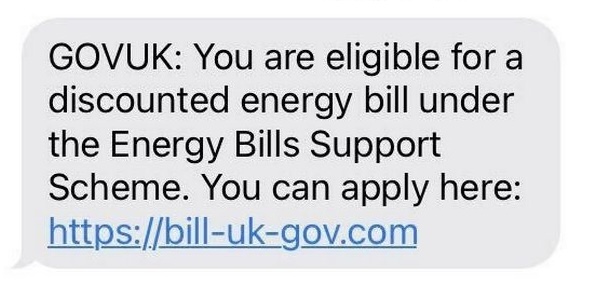Over two-thirds of the UK have been targeted by scams. How can you protect yourself?
FRAUDSTERS have been targeting vulnerable people across the country with cost-of-living scams, hitting those who are struggling most the hardest.
One of the most common scams consists of sending out fake government website links asking for personal details to claim a government payment.
One 72-year-old who didn’t want to be named said that she felt embarrassed to have almost fallen victim to one of these scams.
“I got a text message that claimed to be from GOVUK saying that I was eligible for support to pay my energy bill and to follow the link to what I thought was the UK government website,” she said.
“It took me to a form that asked for some details so that I could apply for the discount scheme.”
She said she had been extremely concerned about rising costs so didn’t think twice before clicking on the link.
“I knew that the government was offering the £400 to help toward the rising living costs but I hadn’t paid much attention to how this worked,” she said.
“I don’t think that it was explained very clearly, especially to people like me who live alone and aren’t very used to technology.”

Luckily the pensioner’s son arrived to drop off some shopping while she was filling in the details and told her that the text looked like a scam.
“I’m just glad he arrived when he did,” said the grandmother.
“It’s terrible that they’re targeting people who are already struggling because of the cost-of-living crisis, they’re just making life so much more difficult for everyone.”
Others have also expressed their concerns that elderly family members may fall victim to fraud.
“I’m worried about my grandma because she lives alone and doesn’t use technology that much, so I don’t think that she’d be able to spot a scam,” said Ffion Evans from Cathays.
What are the scams?
Research by Citizens Advice found that these experiences are common and by June 2022 over 40 million people in the UK had already been targeted.
This is 14% higher than the figure from the previous year, suggesting that scammers are taking advantage of the cost-of-living crisis.
Other scams include fake investments where people are asked to give their bank details or transfer a certain amount of money with the promise that they will receive thousands in return.
One Facebook post falsely quoted money-saving expert Martin Lewis, who has been warning people against this type of scam.

People have also been receiving emails claiming to offer energy bill rebates with links to legitimate-looking websites.
Some of these websites even include the logo of OfGem, the Office of Gas and Electricity Markets, to mislead people into believing that it’s from a genuine source.
Some scammers have gone as far as impersonating supermarkets in social media posts and emails claiming to offer food parcels of items that are near their expiry date.
People are asked to fill in a form to claim their free food which leads to their financial information being stolen by the third-party website.
How do I avoid being scammed?
South Wales Police have been regularly sharing advice on social media and are part of the national anti-fraud campaign, communications officer Tom Jones told The Cardiffian.
They follow the advice of ActionFraud and suggest that people stop and think before parting ways with their money unless they’re 100% sure to who it’s being sent.
It is also advised that any request for money is challenged and for people not to be afraid to ignore or reject any requests, especially if someone is trying to rush the transaction as this usually indicates a scammer.
Cardiff council also suggests that people take time to consider whether an offer is too good to be true and look for any addresses or information that could be used to check if it’s a scam.
It advises against giving away personal information and making payments with the promise of a large payoff in the future.

I think I’ve been scammed, what do I do next?
While being cautious is important, the use of logos and legitimate-looking websites makes it increasingly difficult to spot scams.
ActionFraud recommends that people immediately contact their bank if they believe that they have fallen victim.
Although it can be a long and stressful process, banks are often able to recover any money lost to fraud if they are contacted soon enough.
“By reporting scams and sharing our own experiences, we can work together to protect ourselves and each other,” said Dame Clare Moriarty, chief executive of Citizens Advice.
- If you receive any texts, emails, or phone calls that you believe are scams you should report them by forwarding them to report@phishing.gov.uk or 7726.
- They can also be reported over the phone at 0300 123 2040.



